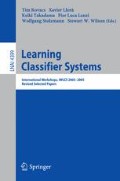Abstract
The accuracy-based fitness approach in XCS is one of the most significant changes in comparison with original learning classifier systems. Nonetheless, neither the scaled accuracy function, nor the importance of the relative fitness approach has been investigated in detail. The recent introduction of tournament selection to XCS has shown to make the system more independent from parameter settings and scaling issues. The question remains if relative accuracy itself is actually necessary in XCS or if the evolutionary process could be based directly on error. This study investigates advantages and disadvantages of pure error-based fitness vs. relative accuracy-based fitness in XCS.
Access this chapter
Tax calculation will be finalised at checkout
Purchases are for personal use only
Preview
Unable to display preview. Download preview PDF.
References
Barry, A.: A hierarchical XCS for long path environments. In: Proceedings of the Third Genetic and Evolutionary Computation Conference (GECCO-2001), pp. 913–920 (2001)
Bernadó, E., Llorà, X., Garrell, J.M.: XCS and GALE: A comparative study of two learning classifier systems and six other learning algorithms on classification tasks. In: Lanzi, P.L., Stolzmann, W., Wilson, S.W. (eds.) IWLCS 2001. LNCS (LNAI), vol. 2321, pp. 115–132. Springer, Heidelberg (2002)
Bull, L., Hurst, J.: ZCS redux. Evolutionary Computation 10(2), 185–205 (2002)
Butz, M.V.: Rule-Based Evolutionary Online Learning Systems: A Principled Approach to LCS Analysis and Design. Studies in Fuzziness and Soft Computing. Springer, Heidelberg (2005)
Butz, M.V., et al.: Bounding the population size to ensure niche support in XCS. IlliGAL report 2004033, Illinois Genetic Algorithms Laboratory, University of Illinois at Urbana-Champaign (2004)
Butz, M.V., Goldberg, D.E., Tharakunnel, K.: Analysis and improvement of fitness exploitation in XCS: Bounding models, tournament selection, and bilateral accuracy. Evolutionary Computation 11, 239–277 (2003)
Butz, M.V., et al.: How XCS evolves accurate classifiers. In: Proceedings of the Third Genetic and Evolutionary Computation Conference (GECCO-2001), pp. 927–934 (2001)
Butz, M.V., et al.: Extracted global structure makes local building block processing effective in XCS. In: GECCO 2005: Genetic and Evolutionary Computation Conference, vol. 1, pp. 655–662 (2005)
Butz, M.V., Sastry, K., Goldberg, D.E.: Tournament selection in XCS. In: Proceedings of the Fifth Genetic and Evolutionary Computation Conference (GECCO-2003), pp. 1857–1869 (2003)
Butz, M.V., Wilson, S.W.: An algorithmic description of XCS. In: Lanzi, P.L., Stolzmann, W., Wilson, S.W. (eds.) IWLCS 2000. LNCS (LNAI), vol. 1996, pp. 253–272. Springer, Heidelberg (2001)
Dixon, P.W., Corne, D.W., Oates, M.J.: A preliminary investigation of modified XCS as a generic data mining tool. In: Lanzi, P.L., Stolzmann, W., Wilson, S.W. (eds.) IWLCS 2001. LNCS (LNAI), vol. 2321, pp. 133–150. Springer, Heidelberg (2002)
Kovacs, T.: Deletion schemes for classifier systems. In: Proceedings of the Genetic and Evolutionary Computation Conference (GECCO-99), pp. 329–336 (1999)
Kovacs, T.: Strength or Accuracy? Fitness calculation in learning classifier systems. In: Lanzi, P.L., Stolzmann, W., Wilson, S.W. (eds.) Learning Classifier Systems. LNCS (LNAI), vol. 1813, pp. 143–160. Springer, Heidelberg (2000)
Kovacs, T.: Towards a theory of strong overgeneral classifiers. In: Foundations of Genetic Algorithms 6, pp. 165–184 (2001)
Lanzi, P.L.: An analysis of generalization in the XCS classifier system. Evolutionary Computation 7(2), 125–149 (1999)
Lanzi, P.L.: An extension to the XCS classifier system for stochastic environments. In: Proceedings of the Genetic and Evolutionary Computation Conference (GECCO-99), pp. 353–360 (1999)
Lanzi, P.L., et al.: Extending XCSF beyond linear approximation. In: GECCO 2005: Genetic and Evolutionary Computation Conference: vol. 2, pp. 1827–1834 (2005)
Lanzi, P.L., et al.: Generalization in XCSF for real inputs. IlliGAL report 2005023, Illinois Genetic Algorithms Laboratory, University of Illinois at Urbana-Champaign (2005)
Venturini, G.: Adaptation in dynamic environments through a minimal probability of exploration. In: From Animals to Animats 3: Proceedings of the Third International Conference on Simulation of Adaptive Behavior, pp. 371–381 (1994)
Widrow, B., Stearns, S.D.: Adaptive Signal Processing. Prentice-Hall, Englewood Cliffs (1985)
Wilson, S.W.: ZCS: A zeroth level classifier system. Evolutionary Computation 2, 1–18 (1994)
Wilson, S.W.: Classifier fitness based on accuracy. Evolutionary Computation 3(2), 149–175 (1995)
Wilson, S.W.: Generalization in the XCS classifier system. In: Genetic Programming 1998: Proceedings of the Third Annual Conference, pp. 665–674 (1998)
Author information
Authors and Affiliations
Editor information
Rights and permissions
Copyright information
© 2007 Springer Berlin Heidelberg
About this paper
Cite this paper
Butz, M.V., Goldberg, D.E., Lanzi, P.L. (2007). Effect of Pure Error-Based Fitness in XCS. In: Kovacs, T., Llorà, X., Takadama, K., Lanzi, P.L., Stolzmann, W., Wilson, S.W. (eds) Learning Classifier Systems. IWLCS IWLCS IWLCS 2003 2004 2005. Lecture Notes in Computer Science(), vol 4399. Springer, Berlin, Heidelberg. https://doi.org/10.1007/978-3-540-71231-2_8
Download citation
DOI: https://doi.org/10.1007/978-3-540-71231-2_8
Publisher Name: Springer, Berlin, Heidelberg
Print ISBN: 978-3-540-71230-5
Online ISBN: 978-3-540-71231-2
eBook Packages: Computer ScienceComputer Science (R0)

